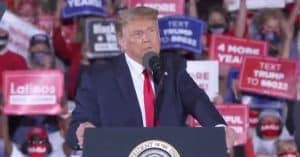Trump Team's Bid to Nullify Georgia Election Case Claims First Amendment Rights
In a significant legal confrontation in Georgia, Donald Trump's attorneys have pushed for the dismissal of election interference charges against him, positioning his 2020 election remarks as protected under the First Amendment.
The prosecution rebutted, claiming that Trump's conduct, allegedly part of a wider criminal scheme, doesn't qualify for First Amendment protection, as ABC News reports.
The defense team, presenting their case in a Fulton County courtroom, underscored that Trump's election-related expressions were safeguarded political speech. They argued for the charges' dismissal, citing First Amendment rights before Judge Scott McAfee, who presided over the hearing without making immediate rulings.
Trump's lawyer, Stephen Sadow, contended that speech regarding elections holds a high place in the spectrum of protected expressions, even if the statements could be false, emphasizing the critical nature of this protection in democratic discourse.
Challenging the First Amendment Shield
Contrasting the defense's stance, prosecutor Donald Wakeford depicted Trump's speech as a part of a criminal conspiracy, thereby stripping it of First Amendment protections. He highlighted that the former president's actions aimed to breach Georgia's RICO statute among other laws, placing them outside the realm of protected speech.
Wakeford accused the defense of attempting to obscure the indictment's core allegations by misrepresenting them as merely protected speech. He argued this mischaracterization aimed to conceal the criminal intent behind Trump's actions.
An expert on racketeering law, John Floyd, suggested that while Trump's remarks might be seen as free speech under different circumstances, within the context of the alleged conspiracy, they suggest criminal intent, emphasizing the complex nature of RICO conspiracy cases.
Legal Definitions at the Heart of the Debate
The hearing also delved into legal semantics, particularly regarding the so-called fake electors. Defense for co-defendant David Shafer contested the indictment's language, arguing against their characterization as public officers. This contention highlights the intricate legal arguments central to the case.
Craig Gillen, Shafer's attorney, challenged the broad definition of "public officer" used by the prosecution, arguing that mere nomination by a political party does not bestow the status of a public official.
In rebuttal, a district attorney's office prosecutor expanded the definition of "public officer" to include individuals acting under government authority, countering the defense's narrower interpretation.
The Wider Implications of the Hearing
Trump's absence from the proceedings, which marked the first since an attempt to disqualify District Attorney Fani Willis was thwarted, underscores the case's high stakes. Alongside 18 others, Trump has pleaded not guilty to charges stemming from the 2020 election's aftermath in Georgia, with four co-defendants agreeing to plea deals.
Previously, Judge McAfee dismissed six counts against Trump and others due to technical issues, showcasing the procedural hurdles within the case.
The defense maintains that the indictment hinges on acts of political speech and advocacy, which they argue are fundamentally safeguarded by the First Amendment, challenging the legal basis of the charges against Trump.
Conclusion: The Intersection of Free Speech and Criminal Law
The court hearing in Georgia has ignited a pivotal debate on the limits of First Amendment protections in the context of alleged criminal conduct. Trump's defense frames his election commentary as protected political speech, while the prosecution views these actions as part of a criminal conspiracy, ineligible for such protections.
The ongoing case presents a critical examination of the interaction between free speech rights and criminal law, with future rulings poised to have profound implications on both legal fronts.




